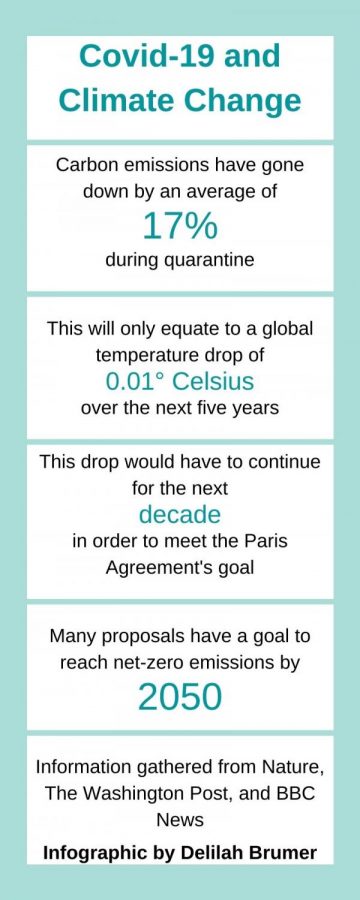Coronavirus closures won’t fix the climate crisis
While temporary coronavirus closures have momentarily slowed the effects of climate change, they will not be enough to reverse its effects.
September 18, 2020
Fewer cars are crammed into freeway lanes and airports have a gentle stream of travelers instead of the usual flood. On average, COVID-19 lockdowns have reduced global carbon emissions by 17% this year compared to 2019, according to the research journal Nature.
These numbers are promising, but the positive effects of COVID-19 on the environment are relatively insignificant for a number of reasons. First, the drop in pollution isn’t very consequential in terms of its effect on climate change. In fact, it will only amount to a reduction in temperature of about 0.01 degrees Celsius in the next five years, according to a 2020 study by Nature Climate Change. The same study suggests that for this emissions decline to become meaningful enough to meet the Paris Climate Agreement of 2015’s goal, it would have to continue at the same rate for 10 years or more.
It is also critical to keep in mind that even though the changes are beneficial, the COVID-19 lockdowns are not permanent. Things will go back to some form of normal, and with this normal lifestyle comes what most people consider typical levels of pollution. Therefore, perhaps the best way to combat climate change is to change our idea of what is normal.
Constant extinctions, regularly occurring extreme weather and massive amounts of coral bleaching are not normal. Often, people have become numb to the sheer severity of climate change. Through taking crucial action, in a comprehensive way, climate change can be kept under control. The best path to act is through a large scale project, such as a Green New Deal or a country-wide carbon tax.
Unlike many solutions to climate change, a Green New Deal and similar plans address more than just pollution. These types of plans address job losses, sustainable technology and fundamentally different infrastructure. According to the New York Times, specific goals include reaching net-zero emissions worldwide by 2050, creating all energy from renewable or emission-free sources, and replacing lost jobs with high-paying environmentally friendly jobs.
A carbon tax is less far-reaching, but can still have many benefits. A carbon tax is a fee charged to fossil fuel polluters in order to economically discourage them from polluting. The tax would primarily affect large fossil fuel and non-renewable energy companies. The carbon tax has already been implemented in some areas and has worked well.
The main argument of those opposed to large scale solutions to climate change is that they are too expensive. According to the Washington Post, Trump and others have suggested that a Green New Deal could cost $100 trillion. Additionally, some lawmakers claim that fighting climate change will cause massive job losses. Third, and most surprising, some people don’t want to combat climate change because they believe that it either isn’t real, is natural, or will only make a minuscule difference. Environmental Protection Agency Administrator Andrew Wheeler has even said, “Climate change isn’t an existential threat.”
Many proposed solutions to climate change are, indeed, expensive. However, versions of the Green New Deal have estimated costs nowhere near $100 trillion. In fact, many different Green New Deal proposals have costs ranging from $1.7 trillion to $16.3 trillion, according to the Washington Post. This may still be costly in the short run, but in the long run, comprehensive measures to battle climate change will save money and lives.
Another common argument is that a solution to climate change will cause massive job losses. Many plans, however, would actually result in a gain of millions of jobs. Democratic presidential nominee Joe Biden’s plan, for example, could provide up to 10 to 20 million jobs, according to Scientific American. Finally, climate change threatening the fate of our planet could not possibly be more of an existential threat.
COVID-19 lockdowns have made modest improvements to global pollution, but will not have a significant impact on the climate. Quarantine has shown that once unthinkable actions are possible, and that a multi-faceted approach to climate change can be enacted. As things grow more urgent, it is clear that we must.


















